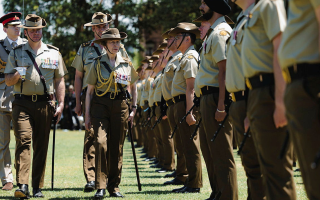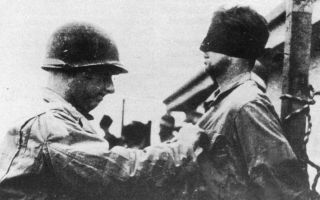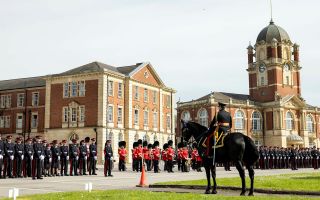
Tri-Service
Comment: The Politics Of Sport

Article by Christopher Lee, BFBS Defence Analyst
Whatever the result of Thursday's Euro 2016 clash with Wales, England will lose because no one likes the English football team - not even the English.
David Cameron however needs England FC to be winning, especially by the June 23rd Referendum. If they are then the national feel good factor will work for him and people will vote Stay.
Mind you, the same could be said for Boris and Co. If England look like they could make it all the way to the finals then the union flag will be being worn with pride and the people will vote Bye Bye.
What we are saying is that support can turn elections - a national success can turn a result by creating a sense of collective ecstasy, counter to that a failure can create a glumness that pervades a country.
British politicians have always made sporting links to whatever game they play at Westminster and now further afield.
The post-war Labour Prime Minister Clement Attlee installed a teletext system when he arrived in Downing Street in 1945, not to monitor world events but to get the latest scores in Victory Test matches between Australia and England.
Many a modern prime minister has been quick to host a party or hand out minor decorations when national teams or individuals have triumphed on the global sporting stage.
More dramatically, Saddam Hussein's son Uday had the Iraqi football team tortured when they lost in the Asian Cup in 2000.
In 2014 North Korean's soccer team was arrested and threatened with execution after losing to South Korea. Losing meant the North Korean people, especially the leader, were shamed. If they had won North Korea would have been proved triumphant, both politically and ideologically.
The conclusion is that only sport creates, or destroys, the sense of pride and unity for a nation state in tender times.
From Wilson, Cameron, Clegg, Mitterrand, Chirac and even Sarkozy - all have invoked the names and spirits of their national sporting sides at the height of bi-lateral relations knowing sporting arena results could not be signs of how international politics would fall.
Could be that is why the American always play among themselves for the World Series events, not taking chances of losing against political as well as sporting rivals?
But the other truth is that the sporting effect does not survive. A Test Match win followed inside three weeks with MBEs all round and flesh-pressing at Downing Street can swiftly be undone by a whitewashing in Australia, leaving the Number Ten PR machine muttering "what was that all about."
The true result has to be quickly taken. In 1970 England failed to qualify for the World Cup four days before Labour (who had basked in England's 1966 success, four months after Moore's side won the Jules Rimet) was beaten at the general election.
Could it be that if England look bad in the group stages, then Cameron will lose the Stay vote? Or could another day of disgruntlement work for Boris against those "bloody Europeans"?
It does not really matter if Wales wins or loses, whatever the oputcome they will always be 'gallant fighters'.
But for England? As a permanent secretary in Whitehall remarked this week. "We have the Referendum, talks on Syria, a NATO summit, talks with Putin's lot, and a shouting match in the EU about an EU Army which we do not want."
"If we should win, we go to all these things as champions."
The thought of David Cameron sporting an England strip in Vienna Geneva and Warsaw is something to contemplate.
All is to plays for. All could easily slip from the grasp. After 1-1 with Russia last weekend, anything is possible when goals decide the political as well as sporting result.








